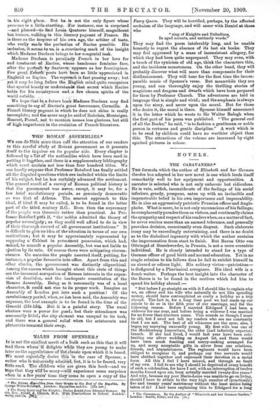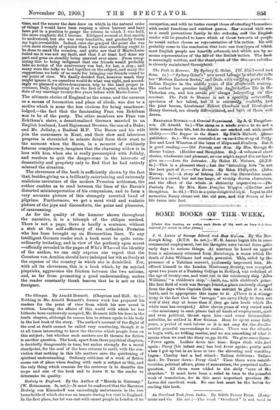NOVELS.
Tat. CARAVANERS.* THE formula which the author of Elizabeth and her German Garden has adopted in her new novel is one which lends itself remarkably well to her equipment and opportunities. A narrator is selected who is not only unheroic but ridiculous. He is vain, selfish, inconsiderate of the feelings of his social inferiors, greedy, pompous, eaten up with an invincible and impenetrable belief in his own importance and impeccability. He is also an aggressively patriotic Prussian officer and Anglo- phobe. What is more, be is not only unconscious of his failings; he complacentlyparades them as virtues, and continually claims the sympathy and respect of his readers when, as a matter of fact, he never excites more than an amused tolerance, and generally provokes derision, occasionally even disgust. Such elaborate irony may be exceedingly entertaining, and there is no doubt as to the diabolical ingenuity with which the author sustains the impersonation from start to finish. But Baron Otto von Ottringel of Storchwerder, in Prussia, is not a mere eccentric individual. He is clearly intended to stand for a type of German officer of good birth and normal education. Yet in no single relation to his fellows does be fail to exhibit himself in an absurd or odious light. His solitary virtue—patriotism- is disfigured by a Pharisaical arrogance. His ideal wife is a, dumb waiter. Perhaps the best insight into the character of the Baron is to be found in the motives which led him to spend his holiday abroad :—
" But before I go straight on with it I should like to explain why we, an officer and his wife who naturally do not like spending money, should have contemplated so costly a holiday as a trip abroad. The fact is, for a long time past we had made up our minds to do so in the fifth year of our marriage, and for the reason. Before I married Edelgard I had been a, widower for one year, and before being a widower I was married for no fewer than nineteen years. This sounds as though,I must be old, but I need not tell my readers who see me constantly that I am not. The best of all witnesses are the eyes; also, I began my marrying unusually young. My first wife was one of the Mecklenburg Lunewitzes, the elder (and infinitely superior) branch. If she had lived, I would last year have been cele- brating our silver wedding on August 1st, and there would have been much feasting and merry-making arranged for us, and man' acceptable gifts in silver from our relations, friends, and acquaintances. The regiment would have been obliged to recognise it, and perhaps our two servants would have clubbed together and expressed their devotion in a metal form. All this I feel I have missed, and through no fault of my own. I fail to see why I should be deprived of every benefit of such a celebration, for have I not, with an interruption of twelver months forced upon me, been aetually married twenty-five years ? And why, because my poor Marie-Luise was unable to go on living, should I have to attain to the very high number of (practically) five and twenty years' matrimony without the least notice being taken of it? I had been explaining this to Edelgard for a long • 2714 Caramatters. By the Author of "Elizabeth and her German Garden." London : Smith, Elder, and Co. [Sa.] eiime, and the nearer the date drew on which in the natural order .e.f things I would have been reaping a silver harvest and haye been put in a position to gauge the esteem in which I -was held, .the more emphatic did I become. Edelgard seemed at first unable .to understand, but she was very teachable, and gradually found .my logic irresistible. Indeed, once she grated the point she was even more strongly of opinion than I was that something ought to be done to mark the occasion, and quite saw that if Marie-Luise Sailed me it was not my fault, and that Let- least had.-done my. -part and gone on steadily being married ever since. From recog- nising this to being indignant that our friends would probably take no notice of the anniversary was but, for her, a step ; and many were the talks we had together on the subject, and many the suggestions we both of us made for bringing-our friends round to our point of view. We finally decided that, however .raueh they . might ignore it, we ourselves would do what waa right, and accord- angly we planned a silver-honeymoon trip to the land proper to romance, Italy, beginning it on the first of August, which .was .the date of my marriage twenty-five years before with Marie-Luise."
The ultimate choice of England as the scene, and the caravan
as a means of locomotion and place of abode, was -due to a motive which is none the less obvious for being nna.cknow- ledged,—the fact that the fascinating Frau von Eckthnm .was to be of the party. The other members are Frau von Eckthum's sister, a denationalised German married to an English husband; Lord Sigismund Browne, the son of a Duke; and Mr. Jellaby, a Radical M.P. The Baron and his wife join the caravaners in Kent, and their slow and laborious progress is chronicled in minute detail from their start to the moment when the Baron, in a moment of sublimely
fatuous complacency, imagines that the charming widow is in. love with him, when she is really preoccupied with Jellaby, and resolves to quit the danger-zone in the interests of domesticity and propriety only to find that he had entirely misread the situation.
The cleverness of the book is sufficiently shown by the fact • that, besides giving us a brilliantly entertaining and extremely malicious caricature of the modern Prussian nobleman, the author enables us to read between the lines of the Baron's distorted misinterpretation of his companions, and to form a very accurate picture of this strangely assorted band of pilgrims. Furthermore, we get a most vivid and realistic picture of the joys and discomforts, the pains and pleasures, of caravanning.
As for the quality of the humour shown throughout the narrative, it is a triumph of the oblique method. There is not a page; there is hardly a sentence, without a stab at the self-sufficiency of the orthodox Prussian who has been brought up on Bismarckian lines. To any intelligent German reader such a book must be quite extra- ordinarily irritating, and in view of the perfectly open secret
—officially revealed in the pages of Who's Who—of the identity of the author, we can only express our regret that the Countess von Arnhim should have indulged her wit so freely at
the expense of the country in which she is domiciled. For, with all its cleverness, this is a book which, by its myriad pinpricks, aggravates the friction between the two nations, and, so far from promoting a good understanding, makes the reader constantly thank heaven that he is not as this foreigner.

























































 Previous page
Previous page